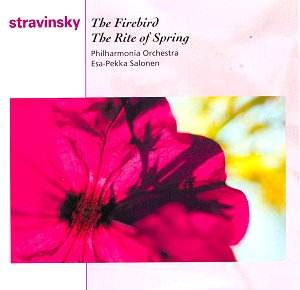Having
just reviewed Salonen's hard-edged and anti-romantic recording
of Messiaen's Turangalila I had fears that this might be
the same. Those fears turned out to be misplaced.
The
Firebird takes a Rimskian palette and supercharges it
with a towering melodic and dramatic imagination. Rimsky hardly
ever attained this mix except perhaps in Sheherazade and
Antar. The recording is resplendently transparent and deeply
detailed with the illusion of depth and breadth outstandingly
captured; listen to the pattering col legno in the right-hand
channel in The Firebird's Pleading (tr.6). I have had my
favourite versions over the years and my first Firebird LP
is not yet supplanted. That was on the cheap Contour reissue label
- originally on Mercury - LSO/Dorati. That recording remains an
astounding monument to the excellence of the analogue medium caught
on a good day, with fine engineers and a hall to match. You can
still hear it on a Mercury CD. Also very good though not in the
same league from an audio viewpoint, is Stravinsky's own recordings
of both ballets. The Haitink LPO version of the last 1970s is
bland by comparison. This present version is well up to the standard
of the Dorati, with intoxication and visceral excitement to be
heard in the vehemence of the Infernal Dance of Kaschei's subjects.
This is a fantastically conceived reading and as a work it coheres
with a quasi-symphonic logic; not something normally associated
with ballet scores. Salonen infuses the score with gaudy fairytale
colours - a musical counterpart to the illustrations of Kay Nielsen
and the designs of Leon Bakst. Only in the general rejoicing of
tr. 22 (the finale) was I disappointed in the absence of an awesomely
thunderous bass drum something Dorati does not shrink from in
his Mercury recording.
The
third and last of the grand ballets is The Rite of Spring.
This gurgles and stamps, shrieks and flickers just as
it should. The Ritual of Abduction shudders with unruly
life. The rip and rasp of the massed horns in Ritual of the
Rival Tribes is shattering and Salonen's way with the Dance
of the Earth is fearsome. He points up the Ravel-allusions
in the Mystic Circle of the Young Girls. I have never heard
hysteria like that thrown off with such velocity in the howling
violins of the final Sacrifical Dance.
The
liner notes, often an all too easy target for reviewers of bargain
price discs, are by Julian Haylock. They are in English only (as
is the case with the Essential Classics series) and run to three
detailed pages avoiding musical technicality and informing us
about plot and creative and performance history.
Salonen
is wholly vindicated in his interpretative choices. Nothing is
commonplace and the Sony engineering team have done everyone proud.
With one transient cavil I would rate these two pieces as amongst
the very best available. Why pay more?
Rob
Barnett
